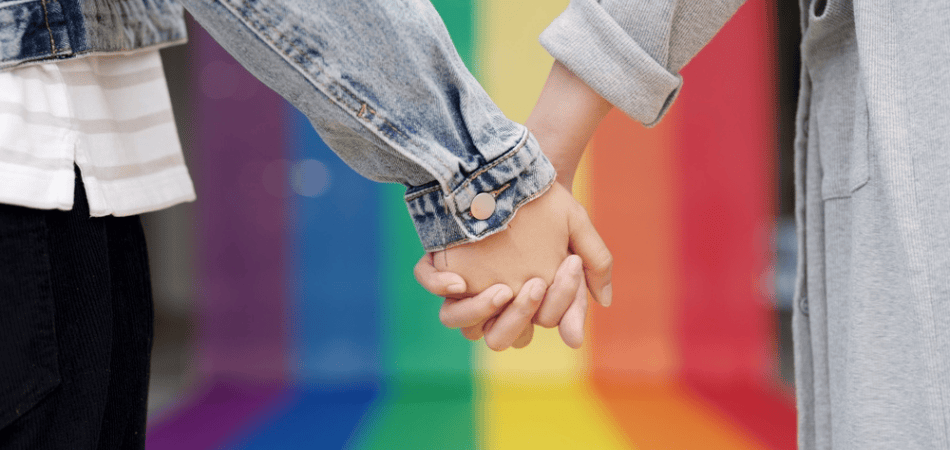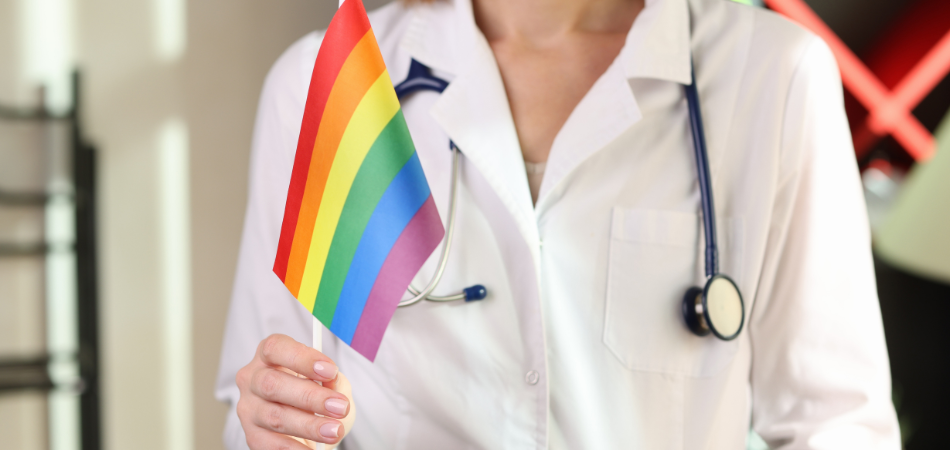Last Updated:
April 3rd, 2025

The UK was recently ranked as the second-worst country for mental health out of 71 countries studied. The aftermath of COVID-19, low wages, smartphone use in children, ultra-processed food consumption and poor family relationships were all cited as reasons.
Mental health tends to be worse in LGBTQ+ populations, who are dealing with all of these things but have additional challenges that can also impact their well-being.
We’re going to take a look at the main challenges to LGBTQ+ mental health in the UK, and what we can do to address them.
Mental health and the LGBTQ+ community
The causes of mental health conditions are multifaceted, and genes, life experiences, trauma and adverse childhood events all play a role. Higher rates of exclusion, rejection and trauma are responsible for the increased rates of mental health conditions in the LGBTQ+ community.
Minority stress theory states that people from marginalised populations experience poorer outcomes due to their minority status. These outcomes include addiction, mental health problems, and overall poorer health.
Rates of depression and anxiety are high in the LGBTQ+ population. About half of LGBTQ+ people have experienced depression, compared to 1 in 6 people in the general population. 3 in 5 LQBTQ+ people have experienced anxiety, compared to 22.5% of people in the general population.
Rates of OCD are higher in people with a sexual minority identity – they are nine times more likely to receive a diagnosis or treatment for OCD. In addition, trauma is higher in the LGBTQ+ community. Family rejection, stigmatisation and violence are traumatic experiences that LGBTQ+ people face at higher rates, and studies estimate over 40% of LGBTQ+ people meet the criteria for a diagnosis of PTSD.
Rates of addiction and substance use are higher in the LGBTQ+ community, and the elevated risk of mental health conditions and addiction means LGBTQ+ people are more likely to receive a dual diagnosis.
Autistic people are more likely to identify as LGBTQ+. It isn’t known why this is, but some have theorised that this is due to autistic people being less influenced by societal norms, making it more likely they realise their identities and are open about them. They also may have a different perspective on gender.
The impact of stigma and discrimination
While the UK has become more accepting of LGBTQ+ people in recent years, this is a relatively recent development – and it isn’t universal. Marginalisation can start early, and almost half of LGBTQ+ young people experience bullying. In the adult population, 77% of LGBTQ+ people experience a hate crime at least once in their lifetime. Family rejection also places people at risk of mental health problems, and removes a support network that many people rely upon to help them in difficult times. LGBTQ+ youth are at a higher risk of family rejection.
Rejection, bullying and violence contribute to self-stigma, and many LGBTQ+ people may blame themselves and their identities for the difficulties they’ve experienced when interacting with others. Rejection and self-stigma can make accessing treatment for mental health more difficult – LGBTQ+ people may blame themselves for not being ‘strong enough’. They may also be anxious about entering treatment with smaller support networks.

Access to mental health services
LGBTQ+ people may mistrust mental health services for understandable reasons. Historically, mental health institutions have been hostile to LGBTQ+ identities.
Homosexuality was listed as a sociopathic personality disorder in the DSM in 1952 and remained listed as a disorder until 1974. However, this did not mean that there was a consensus that homosexuality was not a mental disorder, and the diagnosis of ‘sexual orientation disturbance’ remained in its place. There continued to be debate around homosexuality as a disorder until it was completely removed in 1987.
Gender dysphoria is still listed as a mental health disorder in the DSM. This topic is controversial, and some argue that a diagnosis of gender dysphoria is not necessary for a person to be considered transexual or to identify as trans.
There is a history of questioning LGBTQ+ identities in psychiatry, and they have been viewed as pathological, harmful or immature. These were not fringe ideas – they were part of mainstream psychiatry. For these reasons, it makes sense that LGBTQ+ people may be wary of seeking help in institutions that have previously seen them as abnormal and their identity as something that needs treatment.
Studies have also shown that LGBTQ+ people seeking help for serious mental health conditions like bipolar disorder or schizophrenia receive significantly worse treatment.
The importance of affirming environments
LGBTQ+ people report lower levels of satisfaction for mental health treatment centres. Seeking help from mental health services is a vulnerable thing to do, meaning it’s crucial that people feel safe. Some quite basic adjustments can make a big difference.
Service providers should avoid assuming heterosexuality or gender identity and not make a causal link between mental illness and sexual orientation or gender. Person-centred approaches based on acceptance are crucial, as is a safe environment where identities are not threatened or stigmatised.
The role of community and peer support
Mental health services in the UK are very stretched, and the available services may not always feel safe for LGBTQ+ people. Community and peer support groups can play a vital role in helping LGBTQ+ people access services and helping them feel supported, understood, and less alone.
There are a variety of services for LGBTQ+ people – and many are specialised services targeting specific groups, like trans people or LGBTQ+ people of colour. These groups are often small and struggle for funding – but they play a vital role in transforming the lives of LGBTQ+ people who struggle with their mental health.



